PRESS RELEASE
Department of Health and Human Services
*************************
LANSING – The Michigan Department of Health and Human Services (MDHHS) is urging all Michigan residents to get tested and learn their HIV status in observance of National HIV Testing Day on Tuesday, June 27.
The Centers for Disease Control and Prevention (CDC) estimates that about one in seven people infected with HIV in the United States does not know their status and needs to be tested., regardless of gender identity or sexual orientation. One in four people diagnosed in Michigan since 2021 were late-diagnosed, meaning those affected lived with HIV for years without knowing it. With the right tests to determine HIV status, prompt treatment of HIV exposures, and ongoing preventive care, more than 90 percent of new HIV cases in the United States could be prevented, according to the CDC.
“There are many ways to test yourself for HIV that can be a quick and easy addition to routine healthcare,” said Dr Natasha Bagdasarian, Chief Medical Executive. “An HIV test is the only way to find out if you have the virus, as symptoms may not develop for years. Getting tested will help protect you and your partners, and if you test positive, it’s important to start treatment as soon as possible. Talk to your doctor about risk factors and other options such as pre-exposure prophylaxis (PrEP), which can help reduce the risk of acquiring HIV. Post-exposure prophylaxis (PEP) is also an option for people who think they may have been recently exposed to HIV and is available in most emergency departments.”
With the right treatment, people with HIV can achieve undetectable status. Undetectable equals untransmissible (U=U) means that a person with HIV who takes medications as prescribed can achieve viral suppression, a state in which the virus is undetectable. Of the people diagnosed with HIV in Michigan in 2023, 81 percent received HIV treatment and 72 percent were virally suppressed. Achieving viral suppression ensures that people with HIV can live longer, healthier lives and prevents transmission to sexual partners.
Currently, the CDC recommends that everyone age 13 and older be tested for HIV at least once in their lifetime as part of routine health care. People who have sex without a condom or who inject drugs should be tested more frequently. Sexually active people who test negative for HIV are advised to ask their doctor about pre-exposure prophylaxis (PrEP). PrEP is a medication that, when taken as prescribed, prevents HIV infection if a person is exposed to the virus.
For more information about HIV testing, treatment, and overcoming HIV stigma, visit CDC.gov/HIVMichigan offers many free or low-cost HIV testing and treatment options throughout the state. To find HIV testing sites, treatment options, or other information, visit Michigan.gov/HIVSTI.
*************************




